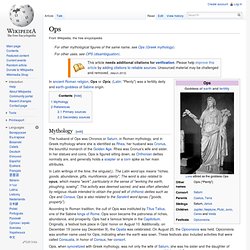

List of Roman deities. A vast number of ancient Roman deities are known by name.
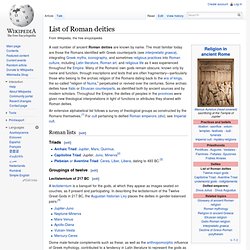
The most familiar today are those the Romans identified with Greek counterparts (see interpretatio graeca), integrating Greek myths, iconography, and sometimes religious practices into Roman culture, including Latin literature, Roman art, and religious life as it was experienced throughout the Empire.
Many of the Romans' own gods remain obscure, known only by name and function, through inscriptions and texts that are often fragmentary—particularly those who belong to the archaic religion of the Romans dating back to the era of kings, the so-called "religion of Numa," perpetuated or revived over the centuries. Some archaic deities have Italic or Etruscan counterparts, as identified both by ancient sources and by modern scholars.
Janus. In ancient Roman religion and myth, Janus (Latin: Ianus, pronounced [ˈiaː.nus]) is the god of beginnings and transitions,[1] thence also of gates, doors, passages, endings and time.

He is usually depicted as having two faces, since he looks to the future and to the past. Lares. Lares (/ˈlɑːriːz/, singular Lar), archaically Lases, were guardian deities in ancient Roman religion.
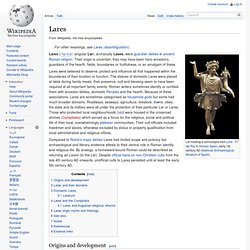
Their origin is uncertain; they may have been hero-ancestors, guardians of the hearth, fields, boundaries or fruitfulness, or an amalgam of these. Lares were believed to observe, protect and influence all that happened within the boundaries of their location or function. The statues of domestic Lares were placed at table during family meals; their presence, cult and blessing seem to have been required at all important family events. Roman writers sometimes identify or conflate them with ancestor-deities, domestic Penates and the hearth. Because of these associations, Lares are sometimes categorised as household gods but some had much broader domains. Compared to Rome's major deities Lares had limited scope and potency but archaeological and literary evidence attests to their central role in Roman identity and religious life.
Quirinus. In Roman mythology and religion, Quirinus is an early god of the Roman state.
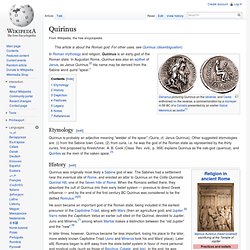
In Augustan Rome, Quirinus was also an epithet of Janus, as Janus Quirinus.[2] His name may be derived from the Sabine word quiris "spear. " Etymology[edit] Quirinus is probably an adjective meaning "wielder of the spear" (Quiris, cf. Janus Quirinus). Other suggested etymologies are: (i) from the Sabine town Cures; (2) from curia, i.e. he was the god of the Roman state as represented by the thirty curies, first proposed by Krestchmer.
History[edit] Quirinus was originally most likely a Sabine god of war. Religious historian A. Genius (mythology) Winged genius facing a woman with a tambourine and mirror, from southern Italy, about 320 BC.
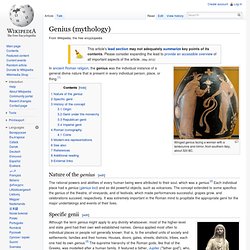
In ancient Roman religion, the genius was the individual instance of a general divine nature that is present in every individual person, place, or thing.[1] The rational powers and abilities of every human being were attributed to their soul, which was a genius.[2] Each individual place had a genius (genius loci) and so did powerful objects, such as volcanoes. The concept extended to some specifics: the genius of the theatre, of vineyards, and of festivals, which made performances successful, grapes grow, and celebrations succeed, respectively. It was extremely important in the Roman mind to propitiate the appropriate genii for the major undertakings and events of their lives. The juno was worshipped under many titles: Faunus. Faunus was one of the oldest Roman deities, known as the di indigetes.
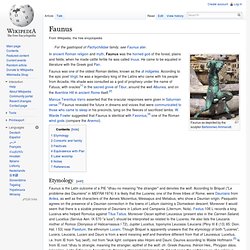
According to the epic poet Virgil, he was a legendary king of the Latins who came with his people from Arcadia. His shade was consulted as a god of prophecy under the name of Fatuus, with oracles[1] in the sacred grove of Tibur, around the well Albunea, and on the Aventine Hill in ancient Rome itself.[2] Etymology[edit] Faunus is the Latin outcome of a PIE *dhau-no meaning "the strangler" and denotes the wolf.
According to Briquel ("Le problème des Dauniens" in MEFRA 1974) it is likely that the Luceres, one of the three tribes of Rome, were Daunians from Ardea, as well as the characters of the Aeneis Mezentius, Messapus and Metabus, who show a Daunian origin. Consorts and family[edit] A Roman imperial bust of Faunus found in 1820 in Vienne (France). Festivals[edit] In Nonnos' Dionysiaca, Faunus/Phaunos accompanied Dionysus when the god campaigned in India. Equivalence with Pan[edit] Later worship[edit] Notes[edit] Priapus. For the ancient city in Asia Minor, see Karabiga.
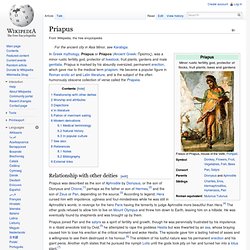
In Greek mythology, Priapus or Priapos (Ancient Greek: Πρίαπος), was a minor rustic fertility god, protector of livestock, fruit plants, gardens and male genitalia. Priapus is marked by his absurdly oversized, permanent erection, which gave rise to the medical term priapism. He became a popular figure in Roman erotic art and Latin literature, and is the subject of the often humorously obscene collection of verse called the Priapeia. Relationship with other deities[edit] Ops. In ancient Roman religion, Ops or Opis, (Latin: "Plenty") was a fertility deity and earth-goddess of Sabine origin.
